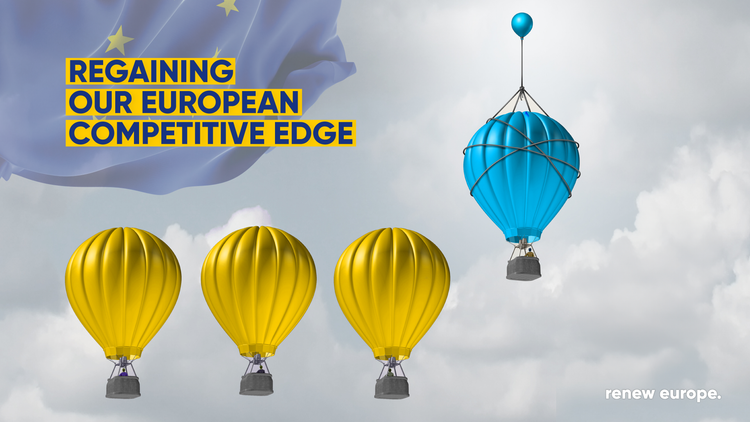Time to save the EU’s competitive edge… before it’s too late
Auteur : Vincent Stuer
Date :
Warning signs are flashing over Europe’s economic strength. The global economy is fragmenting, the EU’s share is getting smaller. Energy and commodity price hikes are disproportionately hard on Europe. But in part, we have only ourselves to blame. We continue to underinvest in R&D, fail to create an environment for tech companies to thrive, persist with disconnected energy and capital markets and restrictive rules for investment firms.
In today’s world, that just won’t do. It’s time to refocus Europe’s political energy on regaining competitiveness.
Success stories losing momentum
The key is in the politics. Renew Europe is launching 10 proposals on how to regain Europe’s competitive edge.
A dedicated European Commissioner for enforcement would make a big difference, first to make sure existing EU rules are implemented and enforced in a harmonised manner, in particular in the digital sector, and going forward to better align Europe’s industrial, green and digital services policies. ‘Think small first’ should be the principle. SMEs have a key role in the green and digital transitions. They need easier access to capital, lower administrative burden, better participation in public procurement. After the much-needed SME Relief Package, we need an SME Empowering Package to help them compete on the global stage. That in turn would help assuage political anxieties.
Our loss of competitiveness also highlights some of the EU’s traditional success stories losing traction. Trade has always been an effective extension of Europe’s single market, but it has come under increasing pressure as a result of economic, geopolitical and environmental factors. More than before, it demands us to continue to open trade and investment markets abroad while countering protectionist and unfair trade practices elsewhere. Via the Global Gateway, the EU should promote trade and cooperation, countering the influence of other global actors.
All ‘bout the money... almost
More than ever, investment is needed to make trade work. To close the gap in the global innovation race, we want to advance the goal of allocating 3% of the EU's GDP to R&I to 2027. EU tech ambassadors to major innovation hubs like Silicon Valley can help companies connect with networks outside Europe, and vice versa.
Europe’s digital performance is a particular worry. Only 67% of EU households have access to very high-speed broadband networks, compared to 92% in the US. Particularly key for our competitiveness will be completing the Digital Single Market and ensuring a dynamic data economy, including through the targets on digital infrastructure, development of digital skills, and the take-up by businesses of digital tools such as AI, cloud and big data.
In Europe’s bank-based economy, it is often difficult to get funding for highly innovative projects. This funding shortage not only puts European companies at a disadvantage, but also encourages entrepreneurs to relocate to places where capital markets are more developed. We need strategies to promote alternative investment opportunities, lifting excessive barriers for investment banking, addressing EU stock exchanges fragmentation, exploring the creation a European safe asset and dismantling national barriers in capital markets.
Politics is key
Money matters especially in a world where massive state actors use theirs to our detriment.
Existing EU programmes already play a unique role in financing future competitiveness and reduce Europe’s strategic dependence in areas going from batteries to critical chemicals and telecommunications. To go further, we should consider a European Sovereignty Fund. New thinking will be needed to strengthen our open strategic autonomy, and our group categorically rejects attempts to revive old-fashioned and short-sighted ideas like overly flexible state aid rules or policies that would pose risks to the integrity of the Single Market.
Energy is an integral part of our efforts towards more strategic independence. Both for economic and geopolitical reasons, we need to further reduce our dependence on fossil fuel imports and increase the use of renewable energy. By 2030, Europe's energy use needs to reach at least 45% by renewables (42.5% is the binding target) and 11.7% energy consumption reduction.
Tomorrow’s world will not do us any favours. But we have the creative companies, the skills and the combined weight to compete successfully on global markets. The only thing missing is the political will. 2024 is a chance to fix that.
Read the position paper “Regaining our competitive edge”
